Moolenaar, Colleagues: McKinsey Equipped America's Foremost Adversary and Misrepresented Work for the Chinese Military Under Oath
WASHINGTON, D.C.-- Chairman John Moolenaar (R-MI) of the House Select Committee on the Chinese Communist Party and U.S. Senators Marco Rubio (R-FL) and Joni Ernst (R-IA) today exposed new evidence of an American consulting firm, McKinsey & Company, working for the Chinese military and Chinese Communist Party. The lawmakers reveal how McKinsey failed to disclose consulting work for the Chinese government, and appeared to misrepresent the firm’s work for the Chinese government under oath, all while receiving over $480 million to consult for the U.S. military since 2008. In nearly 17 pages, the lawmakers outline the details of McKinsey’s work to advance the Chinese Communist Party and Chinese military, its work to shape the Chinese Communist Party’s five-year plans to surpass the United States, and its failure to report its China work as required by U.S. law.
The lawmakers shared these details with Attorney General Merrick Garland and Defense Secretary Lloyd Austin, calling on the officials to evaluate whether McKinsey complied with US law and whether it should remain eligible to receive Department of Defense contracts. McKinsey’s work on sensitive U.S. national security matters occurred as the company failed to disclose its similar work for China -- while China seeks to threaten the U.S. military and American troops.
--
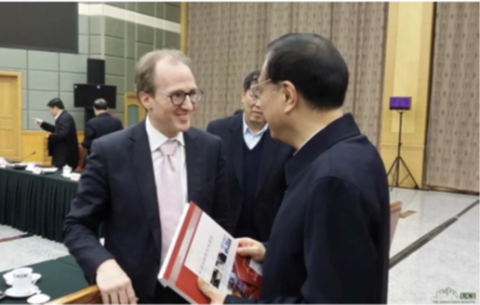
Pictured: In 2015, a McKinsey senior partner hands Chinese Premier Li Keqiang McKinsey’s contributions to China’s five-year plan – which called for growing the Chinese military through civil-military fusion.
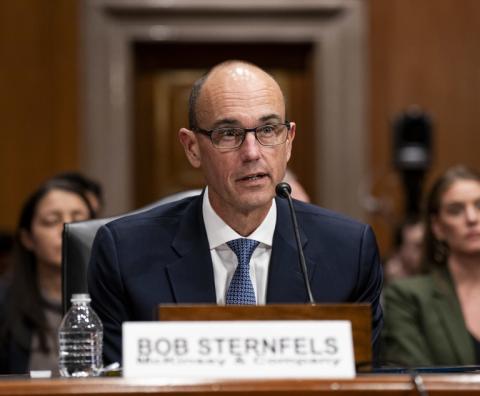
Pictured: In 2024, McKinsey’s managing partner testified under oath that, ‘We’ve never worked with the Chinese Communist Party or the central government in China to the best of my knowledge.
--
The lawmakers write, “It is deeply disturbing that McKinsey, which has a history of undermining the interests of the U.S. government in favor of another client, engaged in sensitive government contracts with DOD while failing to disclose its work with the PRC [People’s Republic of China] government and its state-owned enterprises on issues of national importance.”
They continue, “McKinsey not only failed to make necessary disclosures but actively concealed its sensitive work for the PRC government in sworn testimony before Congress. In describing McKinsey’s Chinese contracts, McKinsey’s Global Managing Partner testified under oath before Congress this year that the company never worked for the central government of the PRC.”
After laying out significant evidence of the threat McKinsey poses to the safety and security of the American people, the lawmakers highlight the massive discrepancies in McKinsey’s Managing Partner’s testimony before Congress in February 2024. Moolenaar, Rubio, and Ernst write:
“During the hearing, McKinsey’s Global Managing Partner made the following sworn statement about McKinsey’s work in China that are at odds with definitive documentary evidence: ‘Senator, we’ve never worked with the Chinese Communist Party or the central government in China to the best of my knowledge…’ This sworn testimony misrepresents McKinsey’s extensive work for the PRC government and its SOEs, directly contradicts statements that the firm made under penalty of perjury in U.S. courts about this business, and requires further scrutiny.”
The lawmakers conclude by requiring a briefing from both Attorney General Garland and Defense Secretary Austin no later than December 1 about McKinsey's legal violations and its status as a DoD contractor.
Read the letter to Secretary Austin HERE.
Read the letter to Attorney General Garland HERE.
Read more about this development in the Financial Times HERE.
Throughout the letter, the lawmakers cite McKinsey's own court filings and website, which brags about work done on behalf of the Chinese Communist Party. For example:
--
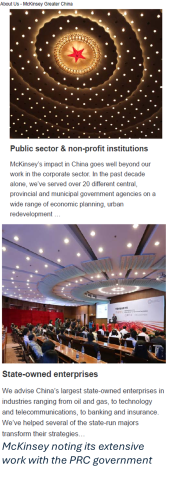
--
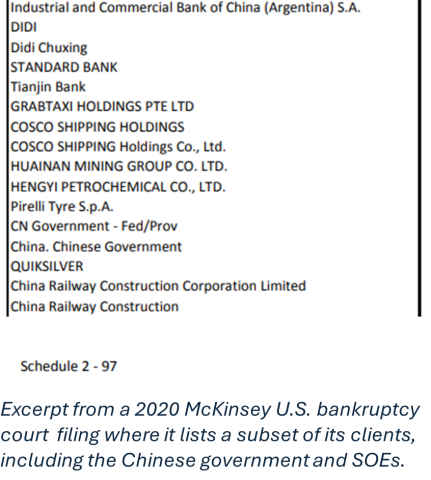
--
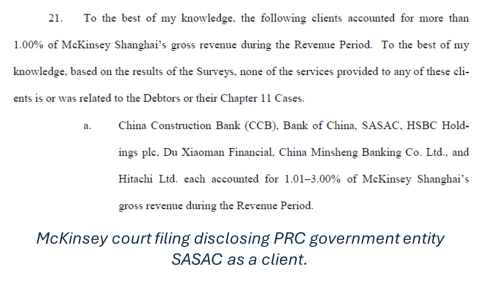
--
The lawmakers also illustrate case-by-case examples of how McKinsey acts as a severe liability to U.S. national security, including:
- While providing consulting services that allowed the PRC to rapidly develop its military and economy in open opposition to U.S. interests, McKinsey substantially increased its defense-related work with the U.S. government, granting it access to classified or otherwise sensitive national security data. McKinsey consulted for the DOD on projects involving the F-35 Joint Strike Fighter program, the renewal and renovation of the U.S. Navy’s principal port facilities, the U.S. Air Force’s Space and Missile Systems Command, and the U.S. Navy’s now-called Naval Information Warfare Systems Command.
- A major client for McKinsey was the PRC national government. Archived versions of the McKinsey China website from the 2010s state that the firm worked for “dozens of government agencies and institutions at the national, regional, and municipal levels.” In fact, McKinsey categorized 10 percent% of its PRC clients as “government & non-profits” in 2017. McKinsey’s own bankruptcy filings from 2020 made under pain and penalty of perjury states that “CN [China] Government – Fed/Prov” and “China. Chinese Government” were clients of the firm.
- McKinsey worked extensively on the China’s 13th five-year plan, which would direct China’s military and economic development from 2016-2020. It was the first five-year plan issued under CCP General Secretary Xi Jinping’s tenure. A branch of the People’s Liberation Army (PLA) Central Military Commission worked alongside the Chinese National Development and Reform Commission in developing the plan, which would have inevitably required McKinsey to coordinate with the PRC military as part of its work.
- A McKinsey senior partner personally handed a copy of the book to then-Premier Li Keqiang at a symposium on the 13th five-year in 2015. Scientific and Technological Revolutions gave an overview of 14 technologies, including robotics, AI, big data, and human genomics, cloud computing, 3D printing, and electric vehicles, which could help China achieve technological supremacy. McKinsey itself noted the military application of these technologies throughout the book.
- During its long tenure in China, McKinsey's Shanghai arm further entrenched its support for the PRC government by completing contracts with local governments and state-owned enterprises to devise their five-year plans, effectively aligning regional economic strategies with Beijing's national objectives to enhance China's technological and financial dominance. This work even began before 2015. In November 2010, China Economic Weekly, a magazine owned by the CCP-controlled People’s Daily News Group, published a cover story titled “The Octopus McKinsey: The Hidden ‘Foreign Brains’ Behind the 12th Five-Year Plan.”
- In 2019, for instance, McKinsey actively empowered China's techno-authoritarian agenda by accepting nearly $1.4 million from the Chinese government to develop a strategic plan for Qingdao, a key port city. This project directly led to the creation of a major economic hub for the Shanghai Cooperation Organization, a China-led security bloc including Russia, Iran, and several others who aspire to challenge Western influence and promote their own authoritarian models of governance.
- In a 2020 bankruptcy filing, McKinsey acknowledged under pain and penalty of perjury that the PRC’s State-Owned Assets Supervision and Administration Commission (SASAC) was its client. SASAC is a special government commission within the PRC that reports directly to the State Council, the nation’s chief administrative authority and equivalent to the national cabinet. SASAC oversees the 96 SOEs deemed most vital to the nation’s economic and geopolitical strategy.
- In U.S. Bankruptcy Court sworn filings over the last several years, McKinsey has acknowledged over two-dozen PRC government state-owned enterprises (SOEs) are its clients, including SOEs designated as Chinese Military Companies and subject to U.S. sanctions. These companies, under the direction of the central government of the PRC, often spearhead CCP initiatives that directly challenge U.S. security and economic interests, often through anticompetitive and sometimes illegal practices. One such client of McKinsey’s is China COSCO Shipping Corporation Limited (COSCO), a state-owned marine logistics and shipping company that Western defense analysts say has helped the People’s Liberation Army (PLA) Navy project power internationally.
- Another PRC SOE, China Communications Construction Company (CCCC), also advertised its hiring of McKinsey for consulting services related to corporate Five-Year Plans. CCCC touted McKinsey’s participation in a 2015 conference related to the firm’s latest Five-Year Plan, explaining that McKinsey “made recommendations regarding the company’s overall strategic objectives.” CCCC is listed as a Chinese military company by the U.S. Department of the Treasury and DOD, and it is illegal for U.S. persons to invest in the company’s publicly traded securities.
- CITIC Group, a financial conglomerate and the largest PRC SOE, was a McKinsey client as early as 2016 and as recently as 2022. CITIC is a major player in the BRI; it planned to spend more than $110 billion and offered Iran a $10 billion line of credit as part of the program. In addition to supporting the centerpiece of the CCP’s foreign policy, CITIC is a primary collaborator of the PRC government’s intelligence apparatus and the PLA.
- McKinsey also worked for several partially state-owned PRC companies involved in semiconductors and microchips. The U.S. government sanctioned two such companies, Semiconductor Manufacturing International Corporation (SMIC) and Yangtze Memory Technology Company (YMTC), for their involvement with the PLA. SMIC has been a client of McKinsey as early as 2017, according to McKinsey’s sworn bankruptcy filings. It was designated a military end-user by Commerce in 2020, was placed on Commerce’s trade blacklist (the Entity List) in 2020, and was determined by DOD to be “owned or controlled” by the PLA in 2022.
- McKinsey has received over $470 million in identifiable DOD contracts since 2008. The firm has received these revenues while executing over 90 prime contracts for DOD and over 15 subcontracts. Based on a review of a subset of DOD documents available to the Select Committee, it appears that McKinsey failed to disclose any potential conflicts of interest. In addition, correspondence with DOD confirmed that, to the best of its knowledge, McKinsey failed to disclose these conflicts of interest for those contracts.
- McKinsey, for instance, failed to disclose its multi-year work on the PRC’s central and defining document, the Five-Year Plan, while it was obtaining highly confidential and classified information about U.S. military capabilities. It failed to disclose its work with COSCO, the PRC government-controlled shipping company that works directly with the PLA Navy, or CCCC, the state-owned construction firm building more than 3,000 acres of islands for PLA military bases in the South China Sea, while it gained sensitive information about the U.S. Navy’s shipyards and its NAVWAR center.
- McKinsey likewise failed to disclose its work with CITIC, a primary collaborator of the PRC government’s intelligence apparatus and the PLA, while working with Defense Information and Systems Agency, the organization tasked with information technology (IT) and communications support to the President, Vice President, Secretary of Defense, the military services, and the combatant commands. In short, McKinsey appears to have failed to disclose its clear and apparent conflicts of interest and potential for the compromise of U.S. national security while working on sensitive U.S. government projects, despite a clear and unambiguous legal obligation to do so.
- During the hearing, McKinsey’s Global Managing Partner made the following sworn statements about McKinsey’s work in China that are at odds with definitive documentary evidence: “Senator, we do no work with the Chinese Communist Party or the central government in China.” This sworn testimony misrepresents McKinsey’s extensive work for the PRC government and its SOEs, directly contradicts statements that the firm made under penalty of perjury in U.S. courts about this business, and requires further scrutiny.